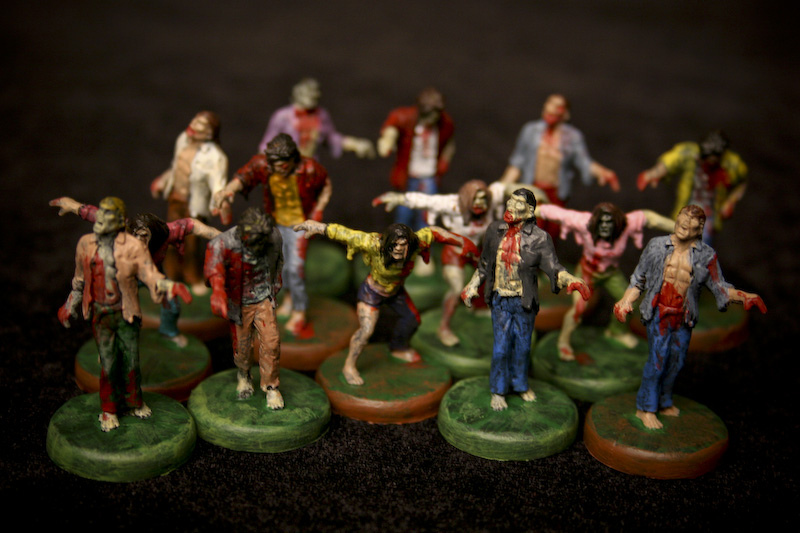A Touch of Evil is a board game that can be best be described as a playable version of Sleepy Hollow. It takes place in the town of Shadowbrook, which has recently be hit by a series of murders. Each player adopts the role of an investigator who is trying to uncover the villain and defeat them in an epic showdown. The elders of the town might be able to help the heroes or they might actually be in league with the villain; it's up to the players to investigate the town before making their move so that they don't hit any nasty surprises. The players are trying to stop the villain before the whole town gets murdered off, but of course they're also racing each other to see who can beat the villain first and take all the credit.
For my first game I played solitaire to get acquainted with the game flow (using two hero characters with the cooperative rules set). My primary goal here was to make sure that someone knew the rules well enough so that the big game night later in the week would go smoothly. Playing solo with two characters allowed the game to move rather quickly, with the game ending in about an hour including time spent re-reading rules for clarification. The expanded Mystery Phase events added to the cooperative game helped accelerate progress by moving the shadow track often and creating investigation (the game's currency) on the board to jump start the economy. I was able to outfit my characters pretty well and win a showdown with the vampire villain no problem. All told it was an enjoyable singleplayer experience, although next time I would incorporate all the advanced rules to increase the difficulty.
With my trial run out of the way it was time for game night. Seven people showed up to play, with me being the only one familiar with the rules. Thankfully the game is pretty intuitive so everyone picked it up quickly. Unfortunately seven players make for a long turn sequence, and the game ended up taking around three hours. At some point we informally switched from a competitive game to a cooperative game for the final showdown in order to just end the damned thing. Despite the length, most people enjoyed the game and are eager to play again (although likely with fewer people and/or faster moving rules).
The villain we matched up against was the Spectral Horseman, and his rampage ride ability was a big hit. Every now and again someone would linger too long at a location and all of the sudden the entire board exploded with fights against the horseman. Unfortunately we had bad luck with Mystery cards and the rider got significantly buffed early on. It's odd to be wishing for murder to strike the town, but the trick is that murder cards both move the game closer to darkness as well as create opportunities. Some cards just straight up buff the villain, and we got a lot of those in the beginning. Because of this the shadow track didn't move very far until late in, so nobody was rushing to get a Lair card and attempt a showdown. But halfway into the game the town elders started dropping like flies, there were autopsies left and right, and all of the sudden the economy was in full swing.
One thing that definitely contributed to the slow down (in addition to the sheer amount of people) was the Fog card that subtracts from player movement. On paper it didn't seem like a big hindrance but it often pushed location runs just out of reach, subtly slowing down everyone's ability to explore. Given the choice between getting halfway to a destination and staying in town to draw another event card most people chose getting a card. All I know is that next time we play I'm buying a horse on my first turn and not looking back.
In spite of the length pretty much everyone still had a good time. But I think I owe them apology. I quote from page 3 the rulebook:
A Touch of Evil, The Supernatural Game can be played by 2-8 players, either Competitively or Cooperatively. For game length reasons you may find it best to limit 7 or 8 player games to Cooperative play or the 'Team Game' covered in the Advanced Game section. The game will work with virtually any number of players (limited only by Hero Characters available), but will become cumbersome with 7 or more individually Competitive players.
Whoops. Oh well. It was still a fun game and it's easy to see how different each session can be. I'm certainly looking forward to the next one.







